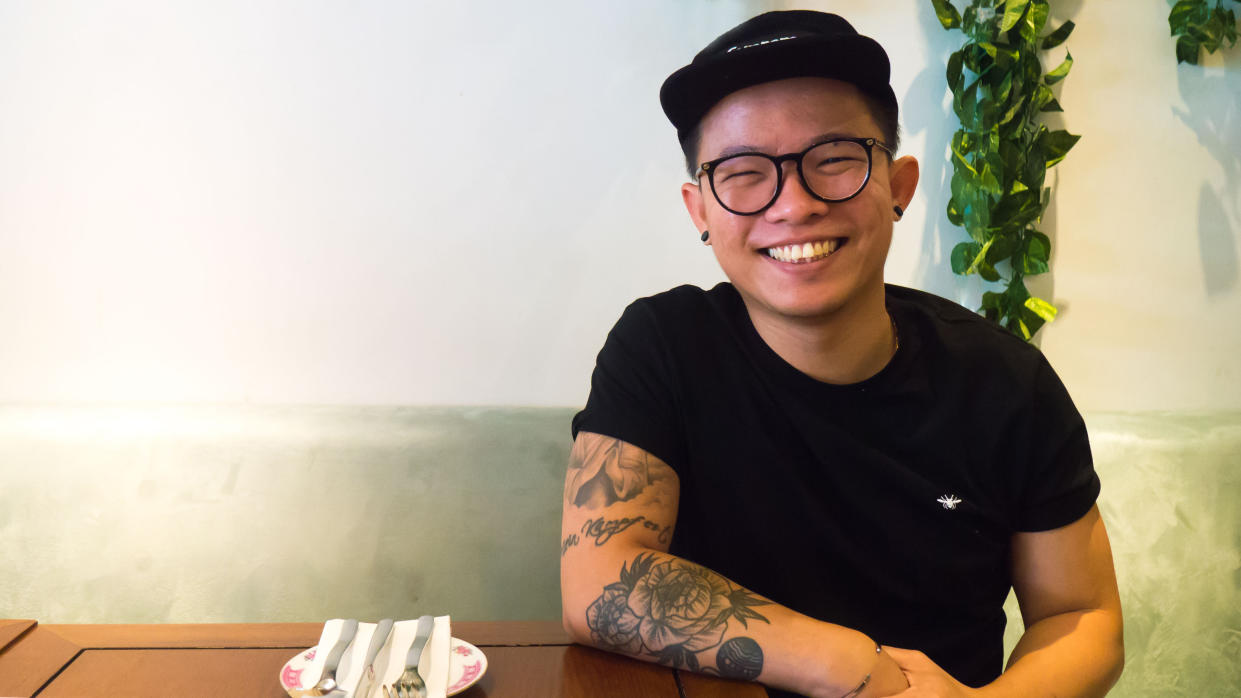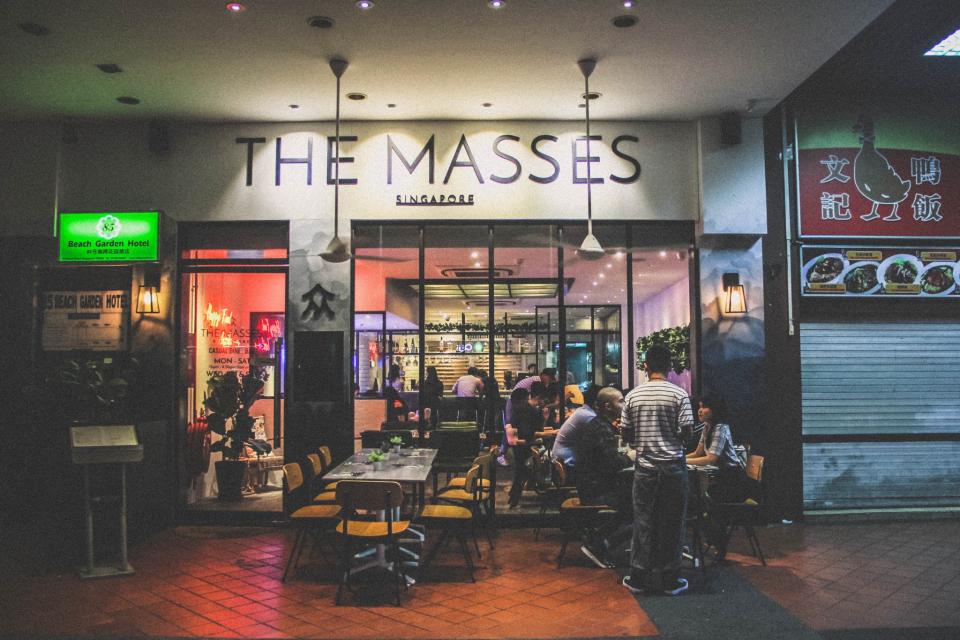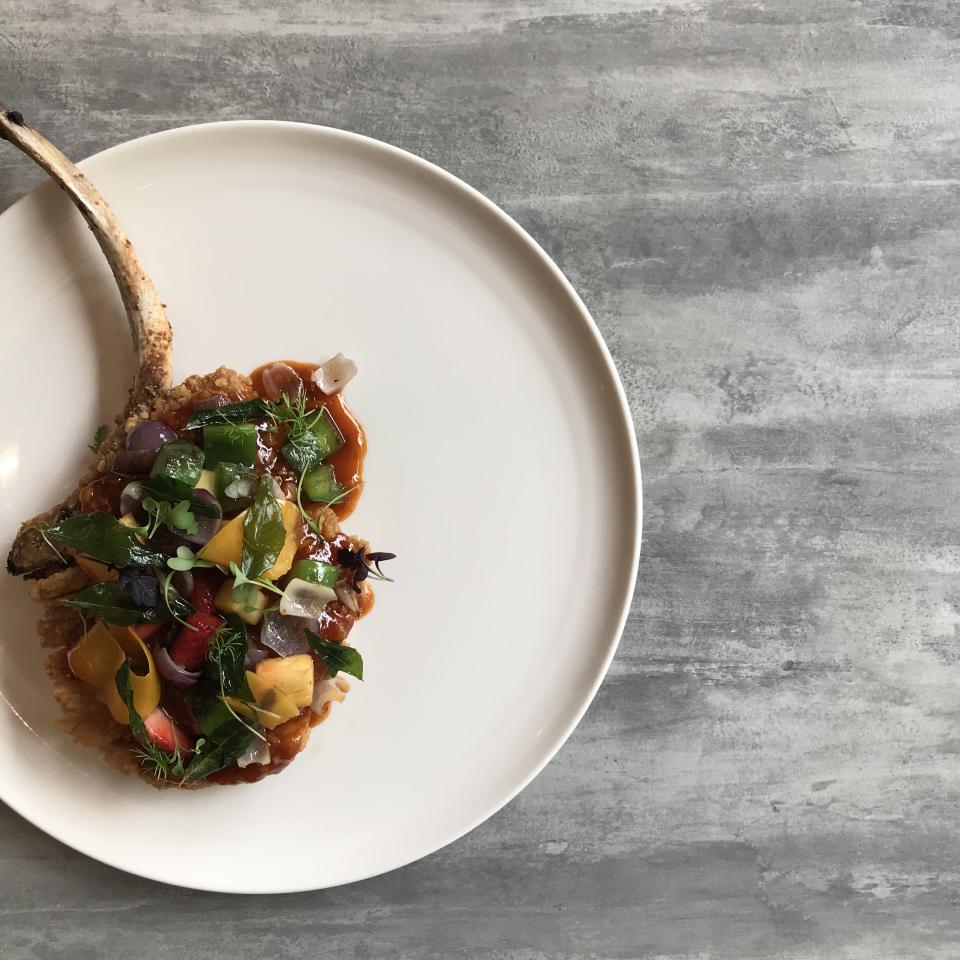INTERVIEW: Chef Dylan Ong, The Masses Singapore reflects on hardships, culinary motivation and hopes for the future

SINGAPORE — I reach The Masses ten minutes behind schedule, forehead glistening with sweat, my breath slightly laboured. I push open the glass doors, walking past bright neon signs and a wall of bottled wines to find Chef Dylan Ong sitting at the bar counter hunched over his laptop.
I apologise profusely for being tardy. Dylan, today dressed head to toe in black, tattoos cascading down his right arm offers to make me a cup of Iced Latte; a much welcome relief to this unbearable afternoon heat. He prepares it personally, all the while discussing the rising trend of Kombucha in Singapore. Save for the chefs in the kitchen busy with their own mise en place, the 40-seater restaurant is ready for lunch service in an hour which gives me plenty of time to be in conversation with Dylan about his growing up years, culinary motivation, and hopes for the future.
READ MORE:
Food review: The Masses Singapore is 'a mecca of gastronomic creativity'
Keisuke restaurant group collaborates with online food delivery service Kemono
The Alkaff Mansion’s Spanish makeover is a toast to all things Basque with its 3 dining concepts
Zat Astha: What was your childhood like growing up, and how has this affected the way you lived your life?
Dylan Ong: I grew up in a very simple family. My parents were both hawkers. Initially, it was just me, my dad and my Mum. But in those days, it was very common to have more than one partner, so my dad married my step mum, and because of that, I had 5 step sisters who were much older than me. We all stayed in one house in Whampoa. It’s very tough to be living in a home with two women, so that was very brave of my dad. We were living quite comfortably. My dad had a Kway Chap stall, while my step mum had a Satay Beehoon stall. So, at a very early age of 5 years old, I’m already hanging out at hawker centres. Then, the environment was not like it is now—it was a place where gangsters hanged out. But I enjoyed it. As I grew older, I did small jobs for my dad to earn some pocket money. It got a bit tougher when my dad fell ill. He had high blood pressure and heart problems, and couldn’t manage the stall, leaving my Mum to handle the stall on her own.
My dad passed away when I was 17. Financially it was a strain to pay off the medical bills we had, so my Mum had to work multiple jobs. I lived off social welfare. Shortly after, she had a minor stroke, which made matters even worst. Thankfully, she’s now recovered quite a bit.
Have you always known that you wanted to work in the food industry?
When I was in ITE, I didn’t study hard. I went to school just for the sake of attending school. I was in my rebellious stage, and my Mum had so much difficulty trying to keep me under control. I was halfway through my studies when I decided I wanted to be in the food business.
Initially, she was very sceptical. “Let’s see how”, she said. I had to borrow money from her to pay for culinary school. She gave it to me but followed that with a warning: That if ever the money she lent me went to waste, she didn’t want to know. After National Service (NS), I decided to open a stall, and I had to borrow another S$7,000 from her. She was so shocked because I just came out of NS and now I’m asking her for more money. I had to reassure her not to worry and that I will make good of my life. With that loan, I opened up my first restaurant, Saveur at a coffee shop. I briefly worked there before my leaving, which was an amicable parting with my partners.

How do you describe what you do to someone you’re meeting for the very first time?
Usually, I won’t tell them what I do. I joke and say that I wait table. I find that it breaks the ice very fast (laughs). But eventually, I will let them know I’m a chef. But when I was young, I prefer to be referred to as a cook. I feel that the term ‘chef’ has a deeper meaning to it. Even in this restaurant, my staff and I call each other by our names. We build a culture where we believe that respect doesn’t mean titles. When you strip away all the titles, all you get is friendship, genuine connection. The titles don’t say anything to me, lah. At the end of the day, it’s not what you do for yourself; instead, it’s what you do for other people. That’s the most important thing.
What’s your fondest memory of food?
My dad and I are not close. He’s quite a hardcore Chinese dad with a shelf temper. Our relationship is built on yes and no: Have you eaten? Yes. Are you going out tomorrow? No. I remember during my 14th birthday, he decided to whip up a meal for me. Back then, my birthday party would always be held at McDonald’s. I would invite friends over, but he would never come. So, this time around when he said he wanted to cook for my birthday, I wasn’t expecting much because every time he cooks, it’s always the same thing. But for some reason, for my 14th, he whipped up a feast of heritage Teochew dishes for the family which I knew was tough given that we were quite financially strapped. That’s when my impression of my dad changed—he wasn’t merely about making kway chap or scolding me all the time. He had so much more to offer.
So now, every time I go back to my Mum’s place to eat, I will take photos of the food she cooked. It’s a way for me to honour the memories of the food she cooks for us. If she passes away, at least I have these photos as a reminder, and it is also something I can cook for my children in the future.
Does the way your dad love change the way you love?
Oh, of course! I remember I once tripped over a small pebble while walking and my dad gave me a tight slap across the face and asked: “Eh, you don’t know how to walk ah?” So now with my daughter, Laurent, I am tough. I feel girls need to be tougher. My dad is an excellent example of how not to be a great example. I don’t want to have the same temperament he has.
At one time in his life when I was 16, my dad couldn’t control his bowels. So sometimes, while in the lift on the way to the fifth floor where we live, he would soil himself. He would also leave traces in the corridor en route to our rental flat. The neighbours always complain to me, and I would have to apologise for him. But it was a humbling experience having to scrub the floor from our house all the way to the lift lobby all the time. I also had to clean him and change him out of his soiled clothes almost on a daily basis. Then, I questioned why my life had to be this tough.

On a scale of 1-10, how successful do you think you are?
Maybe 5? In terms of serving food to the masses, I feel that I’ve more or less fulfilled what I needed to. But, I’ve always wanted to give back to society. Right now, I feel like I can and should contribute more to the community. I am nowhere near where I want to be.
When you look at the state of food in the world today, what is the one thing that gives you hope?
There’s a chef, José Andrés who set up communities in the rural parts of America to give away free food. Being a chef is a professional pursuit. But when I look at other chefs out there doing things beyond the kitchen, I feel like perhaps this is what the job really is about. At the end of the day, what makes people happy is a full stomach, and what these chefs are doing is reaching out to people with food. They are living proof that being a chef is more than just making money or the number of customers you have in your restaurant. That gives me hope.


